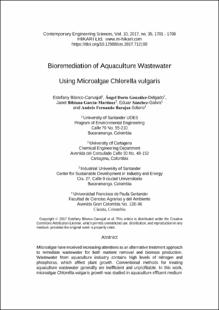Bioremediation of Aquaculture Wastewater Using Microalgae Chlorella vulgaris
Artículo de revista
2017-12-24
Contemporary Engineering Sciences
Bulgaria
Microalgae have received increasing attentions as an alternative treatment approach
to remediate wastewater for both nutrient removal and biomass production.
Wastewater from aquaculture industry contains high levels of nitrogen and
phosphorus, which affect plant growth. Conventional methods for treating
aquaculture wastewater generally are inefficient and unprofitable. In this work,
microalgae Chlorella vulgaris growth was studied in aquaculture effluent medium in order to reduce its contents of NO3 and PO4. Furthermore, the effect of NaHCO3
and Na2CO3 concentrations and addition time on biomass productivity was evaluate
to determine the most suitable conditions for biomass growth. It was found that
highest biomass content (0.3 g/L) was achieved at 3.4 g/L of sodium bicarbonate
concentration and 19 h of addition time.
- Ambiente y Vida - GIAV [124]
Descripción:
Bioremediation of Aquaculture Wastewater Using Microalgae Chlorella vulgaris.pdf
Título: Bioremediation of Aquaculture Wastewater Using Microalgae Chlorella vulgaris.pdf
Tamaño: 581.5Kb
 PDF
PDF
 LEER EN FLIP
LEER EN FLIP
Título: Bioremediation of Aquaculture Wastewater Using Microalgae Chlorella vulgaris.pdf
Tamaño: 581.5Kb
 PDF
PDF
 LEER EN FLIP
LEER EN FLIP
















